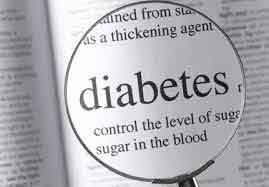- Home
- Editorial
- News
- Practice Guidelines
- Anesthesiology Guidelines
- Cancer Guidelines
- Cardiac Sciences Guidelines
- Critical Care Guidelines
- Dentistry Guidelines
- Dermatology Guidelines
- Diabetes and Endo Guidelines
- Diagnostics Guidelines
- ENT Guidelines
- Featured Practice Guidelines
- Gastroenterology Guidelines
- Geriatrics Guidelines
- Medicine Guidelines
- Nephrology Guidelines
- Neurosciences Guidelines
- Obs and Gynae Guidelines
- Ophthalmology Guidelines
- Orthopaedics Guidelines
- Paediatrics Guidelines
- Psychiatry Guidelines
- Pulmonology Guidelines
- Radiology Guidelines
- Surgery Guidelines
- Urology Guidelines
Stressed fathers can put their kids at high diabetes risk

New fathers please take note! Men who are stressed can put their children at an increased risk of diabetes, an interesting study has found.
According to experts, stress hormones can cause a change in the sperm that induces high blood sugar in the offsprings'.
The research adds to growing evidence that a male's life experience can be passed down to his generation, more than his genetic code alone.
However, the father's stress hormones can be blocked to prevent the changes and the impending damage.
The study involved male mice, but scientists suggested that the findings are likely to be applicable to humans.
In order to induce stress, the researchers confined male mice in plastic tubes for 2 hours a day, for two weeks straight.
Afterwards, the glucose levels in the animals' rose, and the mice gained more weight slowly. The affected mice later showed an increased level of stress hormones called the glucocorticoids in their blood.
These mice were then mated with females that hadn't been confined, and their resulting offspring had higher blood glucose than normal.
"We are very interested in how behavioural change affects glucose homeostasis," said Xiaoying Li from the Shanghai Jiao Tong University in China.
Mouse dads, who were under the psychological stress, produced offsprings with higher blood sugar when compared to their unstressed counterparts, the findings, published in the Cell Metabolism, revealed.
"Paternal psychological stress can result in hyperglycemia in offspring in mice," Li said.
The root of the increased blood sugar was in the gene called Sfmbt2.
When the male mouse was immobilised daily in a plastic tube, the spike of glucocorticoids caused extra methyl groups to be added to the Sfmbt2 gene in his sperm.
By understanding the mechanisms involved, researchers could block the effects of glucocorticoids on the mouse father's sperm, Li added.
Injecting the male mice with a molecule that dampens the effect of glucocorticoids stopped the Sfmbt2 gene from being overly methylated.
According to experts, stress hormones can cause a change in the sperm that induces high blood sugar in the offsprings'.
The research adds to growing evidence that a male's life experience can be passed down to his generation, more than his genetic code alone.
However, the father's stress hormones can be blocked to prevent the changes and the impending damage.
The study involved male mice, but scientists suggested that the findings are likely to be applicable to humans.
In order to induce stress, the researchers confined male mice in plastic tubes for 2 hours a day, for two weeks straight.
Afterwards, the glucose levels in the animals' rose, and the mice gained more weight slowly. The affected mice later showed an increased level of stress hormones called the glucocorticoids in their blood.
These mice were then mated with females that hadn't been confined, and their resulting offspring had higher blood glucose than normal.
"We are very interested in how behavioural change affects glucose homeostasis," said Xiaoying Li from the Shanghai Jiao Tong University in China.
Mouse dads, who were under the psychological stress, produced offsprings with higher blood sugar when compared to their unstressed counterparts, the findings, published in the Cell Metabolism, revealed.
"Paternal psychological stress can result in hyperglycemia in offspring in mice," Li said.
The root of the increased blood sugar was in the gene called Sfmbt2.
When the male mouse was immobilised daily in a plastic tube, the spike of glucocorticoids caused extra methyl groups to be added to the Sfmbt2 gene in his sperm.
By understanding the mechanisms involved, researchers could block the effects of glucocorticoids on the mouse father's sperm, Li added.
Injecting the male mice with a molecule that dampens the effect of glucocorticoids stopped the Sfmbt2 gene from being overly methylated.
Cell Metabolismdiabetesglucocorticoids in their bloodglucose levelshigher blood glucose than normalinduces high blood sugarproduced offspringsrisk of diabetesSfmbt2spike of glucocorticoidsthe Shanghai Jiao Tong UniversityXiaoying Li
Source : IANSNext Story
NO DATA FOUND

Disclaimer: This site is primarily intended for healthcare professionals. Any content/information on this website does not replace the advice of medical and/or health professionals and should not be construed as medical/diagnostic advice/endorsement or prescription. Use of this site is subject to our terms of use, privacy policy, advertisement policy. © 2020 Minerva Medical Treatment Pvt Ltd